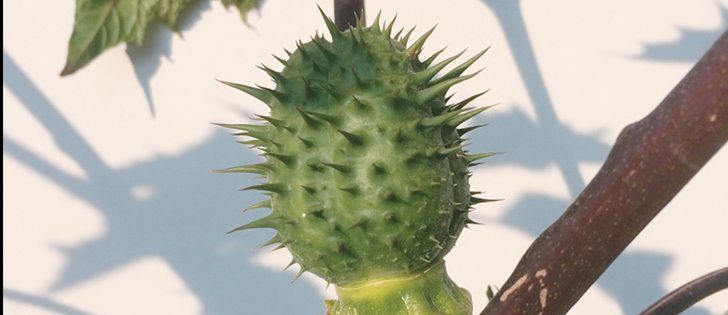A prohibited, noxious weed, extremely poisonous to livestock and humans was discovered in three Alberta canola fields.
Devil’s Trumpet, also known as Jimsonweed was found in canola fields in Westlock, Barrhead and Leduc Counties Aug. 27 and 28 while farmers were swathing canola.
With a similar seed size as canola, provincial weed specialist Nicole Kimmel said they are concerned about the possibility of canola being contaminated with the weed that induces hallucinations and is extremely poisonous.
“Our concern is most canola is used for canola oil and this is a poisonous plant. We are very concerned about human consumption,” she said.
Read Also

Farming Smarter receives financial boost from Alberta government for potato research
Farming Smarter near Lethbridge got a boost to its research equipment, thanks to the Alberta government’s increase in funding for research associations.
Kimmel suspects farmers will find more cases of the towering weed in their canola as swathing progresses.
Devil’s Trumpet is about one and a half metres tall and towers over the canola. It has thick red-to-purple stems, trumpet-like flowers that are pinkish, purplish and whitish, and leaves with irregular toothed margins.
The seed pods are like spiked cucumbers and may contain 600 to 700 seeds per capsule. The capsule explodes once it matures, expelling its seeds.
Devil’s Trumpet is a prohibited noxious weed seed under the federal weed seed order and is not allowed into Canada.
Kimmel believes the weed may have come into the field through a contaminated seed lot.
“That would be my suspicion,” she said.
Blaine Woycheshin, manager of oilseed crops with Invigor Seed said they hadn’t heard about the weed in their canola, but will contact the farmers and Kimmel for more information.
“We will be looking into it,” said Woycheshin, of Calgary.
Kimmel is working with Canadian Food Inspection Agency staff to develop a plan to destroy the plant. Open burning of the plant may create poisonous toxins in the air.
Jacolyn Tigert, agricultural fieldman with Westlock County said a farmer found about 10 plants in his canola field while swathing.
“This weed is a serious weed. All parts of the plant are poisonous. It can cause death to livestock and humans at a low percentage,” she said.
Marilyn Flock, agricultural fieldman with the County of Barrhead said a farmer found about two dozen plants in his canola field while swathing.
“It looks like a tree out in the middle of the crop,” said Flock.
With 610,000 acres of farmland, county officials are relying of farmers to be on the lookout for the weed.
In a news release to local farmers, Westlock County staff warned the plant could end up in livestock feed if the canola straw is baled for feed and the plant is not pulled before swathing.
Aaron Van Beers, agricultural foreman with Leduc County said the weed has been found in one field in Leduc County. The farmer noticed two plants growing while swathing his Invigor L135C canola.
“It does stick out fairly well,” he said.
The farmer pulled the two plants and brought it into the Leduc County office for identification.
“It is a fairly distinct plant, especially with canola plants that are shorter this year.”
“If this is not an isolated incident it could be a fairly big concern. It is a fairly toxic plant,” said Van Beers.
Leduc County staff is asking farmers who find the plant to pull it and bag it and take it to the county office until provincial weed specialists and CFIA officials come up with a plan to destroy the weed.
Van Beers believes the weed seeds were likely in one seed lot. The Leduc county farmer will watch for more plants as he swaths.
Dan Orchard, agronomy specialist with the Canola Council of Canada said they weren’t aware of the weed, but have since notified other canola staff about the weed.
“We will wait until more information from the counties before getting too excited,” he said.
Contact mary.macarthur@producer.com

















